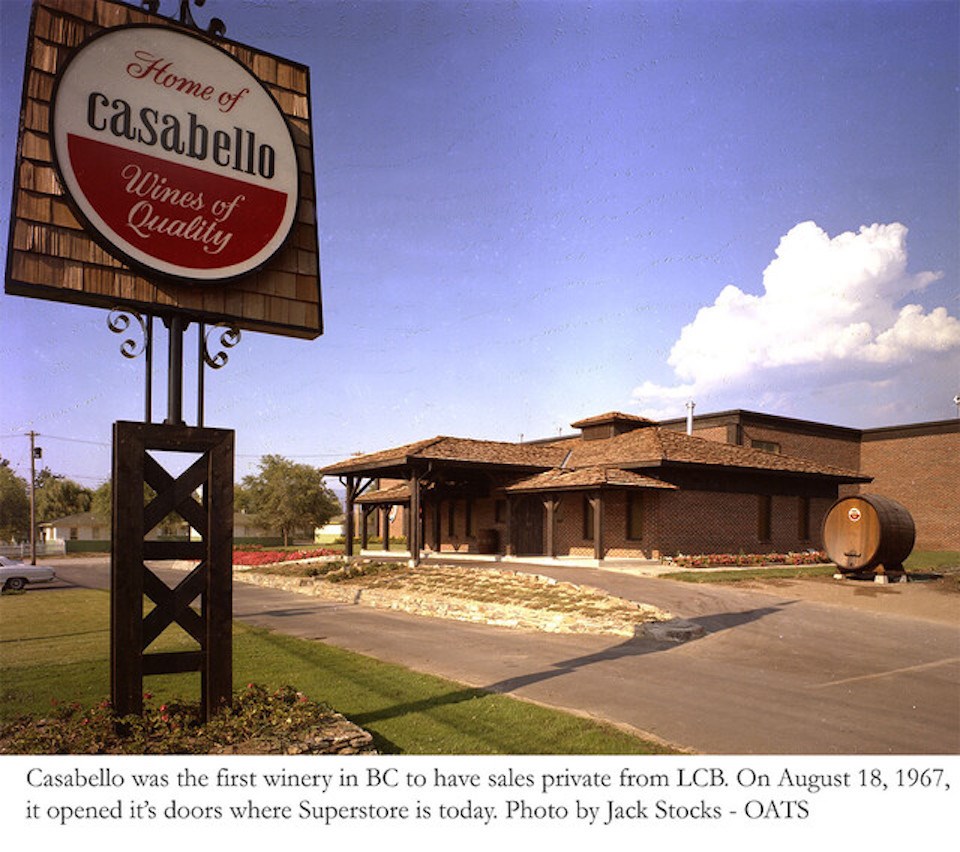“That type of viticulture came alive because of these two men and their struggle to make a commercial winery.”
There are over 170 wineries operating and producing more than 75 grape varietals near Penticton within the wine regions of Naramata, Okanagan Falls and Summerland, according to Visit Penticton.
But what led to Penticton’s area becoming a destination for wine aficionados and thirsty tourists?
Some would say it was all thanks to a pair of brothers from Vancouver being brought out by the town in the 1950's and opening the province’s first-ever tasting room.
Brian Wilson, archivist and executive director of the Okanagan Archive Trust Society, said that two businessmen, Al and Evans Lougheed, were pursued by council to build a hotel since the Hope-Princeton Highway had just opened.
“They really did need a hotel here in town, and so council actually pretty well gave them the City Hall property and the fire hall property, which was on the corner of Martin Street and Nanaimo Avenue,” Wilson said.
The brothers took the property and the Prince Charles Hotel was opened on Oct. 18, 1951.
As tourists flooded in from the Lower Mainland, the Lougheeds began to build up their enterprise, opening a hotel restaurant called the Tartar Room, which Wilson said was lauded by the community.
By 1961, the hotel was the destination place for everybody, supported by the Rotary, the Lions Club and Kiwanis.
After the brothers sold the hotel and dissolved their partnership in 1964, Wilson said that Evans' interest in opening a winery was sparked by running into a local winemaker, Tony Biollo.
“Biollo himself being European, kind of an Italian-Portuguese kind of wine style maker, put in these Beaujolais grapes, these great big red grapes and that was a very European thing.”
When the two began to look for properties, they came to the turkey farm, which is right across the road from where Cherry Lane Mall is today.
“They purchased all of that property from a local farmer and developed it with Tony Biollo being their winemaker, or at least one of their winemakers, and it became an actual public access winery. Now, this is a very big deal for [the Liquor Control Board], because [there were] huge, huge restrictions on what you could do with wine in the day,” Wilson said.
“To have an actual wine gift shop in that era was just a miracle and to own a sales shop away from LCB was a really big political step and supported totally by the city. The city back backed it up, like crazy.”
The winery wasn’t the first in B.C., but it was the first to achieve public sales. According to the BC-winery.com timeline of the British Columbia Wine Industry, Growers Wines of Victoria was the first B.C. winery to be licensed in 1923.
In 1939, the first grape wines produced in B.C. by both The Growers Wine Co. Ltd. and Calona Wines Ltd. were offered for sale.
By 1961, there were five wineries in the province. When Penticton’s Casabello Wines opened in 1966, that became six. Evans would open the wine shop the following year.
"Casabello stoked the fire under other wine producers to design and build their own attractive wine shops to entertain tourists," Wilson wrote in his piece on the Lougheed Brothers in 2014.
Beaujolais grapes were popular at the time for planting, but unfortunately, got a horrible fungus.
According to Wilson, a milestone occurred when the discovery was made that Rhineland grapes and European grapes could survive here if they were grafted onto a local wine stock.
“So they found a wild grape that grew prolifically in the Okanagan, but didn't produce any fruits and they grafted the Rhineland grapes onto them with great success.”
There was only one downside to this tremendous viticulture milestone — the wine “was horrible.”
Gavin Miller, the winemaker at Upper Bench Winery, said that the grapes before the late 80's were all hybrids, like a Marechal Foch or an Ortega.
“They were crosses between American and European grapes because they didn't think European grapes could grow in our climate…That's the sort of wine they were making… just was horrible, just nasty. Basically just cheap alcohol in big jugs. There was no finesse or quality to it at all.”
The provincial government would later sponsor a tear-out program of hybrid grapes starting in 1988, clearing their land and re-planting with Vinifera varieties.
“The grapes just love the soil here. There's no denying that this glacial silt is just golden to grapes,” Wilson said.
Miller arrived in the Okanagan in the 1990s but carries a “fairly good knowledge” of the history of the area before then.
When he arrived, there were just five or six wineries along the Naramata Bench in Penticton.
“Since then, obviously it's just snowballed.”
It took growers another few decades to start to understand what grapes can thrive in the area.
“With us on the Naramata Bench, I have a vineyard with Cabernet Sauvignon at the top, which is a really hot climate grape, and I have Riesling on the bottom, which is a cool climate grape. And that just doesn't happen anywhere else in the world,” Miller said.
“I think probably in the 70s you could have grown the grapes we are growing now. They just didn't realize it.”
Casabello is long gone now, their wine room torn down after being passed on and sold to make way for the Zellers store in 1994, which is now Superstore on Main Street.
“It's kind of a sad story to that point,” Wilson said.
But there were milestones achieved with discoveries made of grape varietals that could thrive, wineries starting to really sprout up throughout the Okanagan and the beginnings of a flourishing industry of tasting rooms that today creates thousands of jobs, all thanks to two brothers who wanted to take a chance in Penticton.
“Tremendous pioneers with a really tremendous milestone.”


